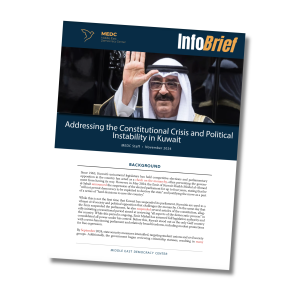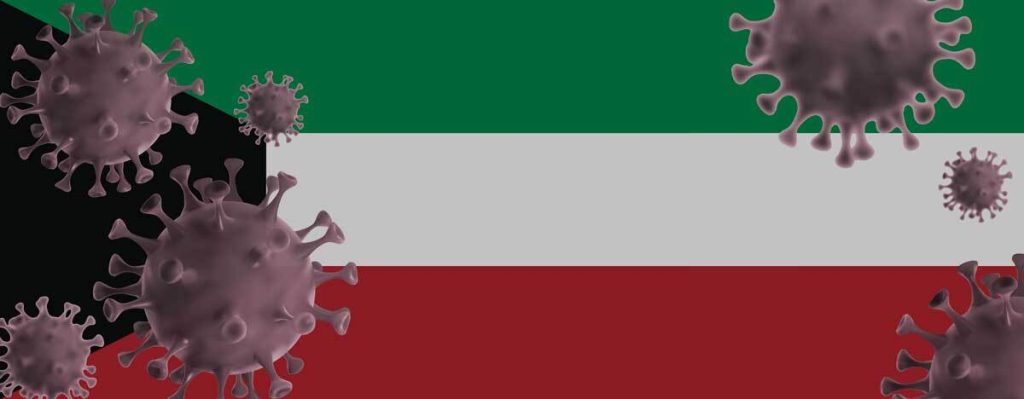Read as PDF
Background
Since 1963, Kuwait’s unicameral legislature has held competitive elections, and parliamentary opposition in the country has acted as a check on the monarchy. But in May 2024, the Emir of Kuwait, Sheikh Mishal al-Ahmed al-Sabah, announced the suspension of the elected parliament for up to four years, stating that he “will not permit democracy to be exploited to destroy the state” and justifying the move as a part of a series of “hard decisions to save the country.”
While this is not the first time that Kuwait has suspended its parliament, Kuwaitis are used to a vibrant civil society and political opposition that challenges the monarchy. On the same day that the Emir suspended the parliament, he also suspended several articles of the constitution, allegedly initiating a transitional period aimed at reviewing “all aspects of the democratic process” in the country. Throughout this transitional period which continues today, Emir Mishal has assumed full legislative authority and consolidated all power under his control.
Kuwait once stood out as the only Gulf country with a semi-functioning parliament and relatively broad freedoms, including modest protections for free expression. But by September 2024, state security measures intensified, targeting student unions and civil society groups. Additionally, the government began reviewing citizenship statuses, resulting in many individuals being stripped of their Kuwaiti citizenship. This action is protected from judicial review due to a 2021 Kuwaiti Constitutional Court ruling, which deemed citizenship withdrawals an act of sovereignty beyond the court’s jurisdiction. Prominent politicians have also faced intimidation, with some being detained, reflecting an increasingly repressive environment.
These political developments in Kuwait have raised significant concerns about the consolidation of power and the deterioration of human rights in the country. The Kuwaiti Emir, in suspending several constitutional articles, including ones pertaining to elections and another requiring National Assembly approval of the Crown Prince, has justified these actions as efforts to stabilize the country and to make government more efficient, but are seen by many as moves to consolidate power and suppress dissent.
As a result of private consultations with a number of Kuwaiti and Gulf democracy advocates and legal experts, the following key issues should be considered by U.S. policymakers for their potentially destabilizing impacts in Kuwait as well as the broader region.
Key Issues and Analysis
Suspension of the Constitution and Dissolution of the Parliament
In May 2024, several articles critical to democratic governance, including key checks and balances, were suspended through royal decree. Articles 51 and 56 grant legislative powers and oversight of elected ministers to the parliament, and with their suspension, the legislature can no longer protect key civil liberties such as free expression and political participation. This has been justified as necessary to fight corruption and restore stability – a pretext used by other autocratic regimes in the region to overrule election results.
Although this alleged narrative of fighting corruption gained some initial support among Kuwaitis, experts argue these measures undermine democratic institutions and limit public participation in governance, signaling a shift towards authoritarian rule that risks increasing discontent among the population.
Revocation of Citizenship as a Tool of Repression
Policies regarding citizenship have become tools for political and social repression in Kuwait. Reports and private discussions with Kuwaiti lawyers and political analysts indicate that the use of nationality laws, such as royal decree No. 15, which gives the Emir the ability to withdraw citizenship from those deemed to undermine the social and political system in the country or belong to foreign political bodies, have largely been used as a tool for social demographic engineering, political repression, changing perceptions of national loyalty, and the undermining of civil liberties. As recently as Saturday, November 2, 2024, a Kuwaiti decree stripped 130 women and their dependents of their citizenship without citing any legal reasons or justifications.
Citizenship revocation is being used to silence dissent and marginalize political opponents, often without judicial oversight. Such practices not only undermine the rule of law, but also create a class of disenfranchised individuals, which deepens social divisions and threatens the stability of Kuwait, in an already divided and fragile region. Kuwait, rich with crude oil and natural gas resources, is surrounded by militarily superior powers such as Iraq, Saudi Arabia, and Iran, who compete for regional dominance and political power.
The Growing Influence of Saudi Arabia and the United Arab Emirates (UAE)
Immediately following the suspension of parliament and the constitutional amendments in Kuwait, the UAE rushed to support and endorse the move and back the Kuwaiti Emir, citing similar concerns over “stability.” Four days later, Saudi authorities also began discussing ways to strengthen cooperation with Kuwait. Since then, the influence of the two Gulf countries on Kuwait has become more and more apparent.
Kuwait has increasingly aligned its internal policies with those of Abu Dhabi and Riyadh, leading to more authoritarian tendencies in Kuwait’s internal politics, regional alliances, and foreign policies. For example, on August 11, Kuwait enacted a new law cracking down on civil society based on a similar Emirati constitutional law. This alignment, coupled with tensions with Iran, plays a critical role in shaping Kuwait’s political decisions and strategies.
Recommendations for U.S. policymakers
The current constitutional crisis in Kuwait presents a critical juncture for the country’s future democratic governance. It is imperative for the United States, a key ally, to engage actively and thoughtfully with the government of Kuwait to encourage a path that supports a return to democratic norms and human rights. Maintaining a democratic and politically stable Kuwait protects American interests by preventing further turmoil in a region that provides key security and economic guarantees for the United States. By supporting democratic institutions and reforms, the United States can contribute positively to Kuwait’s political development and the stability of the wider region.
Policymakers in the United States should:
- Engage diplomatically with Kuwaiti political leaders to advocate for the restoration of Parliament and the reinstatement of suspended constitutional articles.
- Support Kuwaiti civil society organizations that promote democratic governance and human rights.
- Encourage a public national dialogue that includes a wide range of Kuwaiti actors, from government officials to civil society organizations and opposition leaders, to discuss the future of Kuwait’s political landscape in a manner that supports inclusivity, peace, and democracy.
- Call on the Kuwaiti government to stop citizenship revocation and end extrajudicial actions.
- Closely monitor human rights violations by engaging with prominent civil society leaders and activists in Kuwait and in the diaspora, working to monitor and curtail human rights abuses, discrimination, and abuse of citizenship processes.




